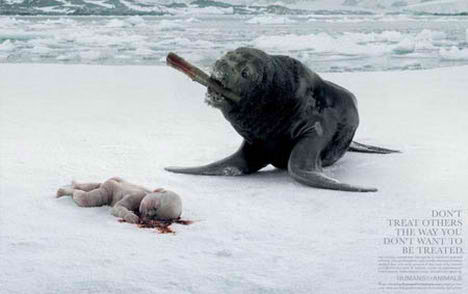
In the picture a large seal is depicted, holding a blunt object, which may be a club. On the ground in front of him lies a vile depiction of a recently beaten infant. As terrible as this picture may seem it is an actual advertisement against human cruelty to animals. To understand why this image has an explicit appeal on human emotion it is important to examine all the elements of this image, disturbing as it may be, in their entirety and how they are connected.
The first thing that can be examined is the seal holding a bloody club. Seals of course are not capable of such actions. This fact is important because it is giving human traits to a very non-human entity. What it suggests is that the animal is in fact capable of human actions and therefore causes the audience to consider that it might also be capable of human emotion. In this depiction the animal is the dominant, as is the case for humans in human-animal relations. Here the roles of dominance have been reversed for emotional appeal. Furthermore the incident is taking place in the animal’s home environment as to suggest that the infant is the intruder in the animal’s home. This is summed up in the only text found on the advertisement, which reads: “Don’t treat others the way you don’t want to be treated.” The audience feels compassion and remorse for the abused infant, which in this case assumes the role of the animal. What it makes the audience consider is the idea that not good or normal person by basic standards of society would ever treat a child that way, why would we treat any other entity, in this case animals, the same way if they are at all capable of emotion which is what the image suggests.
This poster might appeal to animal abusers. If the picture does in fact cause the reader to consider things like remorse or compassion for animals, those who are currently abusing animals might encounter feelings of regret or disgust for their actions, thus causing the reader/viewer to abstain from such actions. In the most desired case those who are affected will not only avoid animal cruelty but also assume a proactive stance against it. The sole objective is to both propose ideas of circumventing animal abuse and conceive notions of pro animal protection in those currently lacking or opposed to the idea.